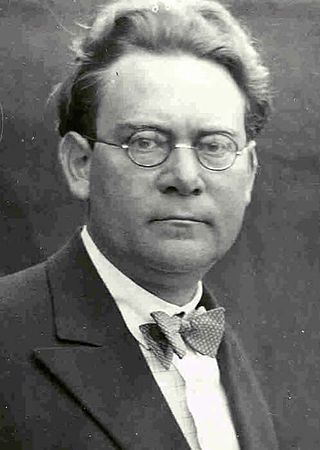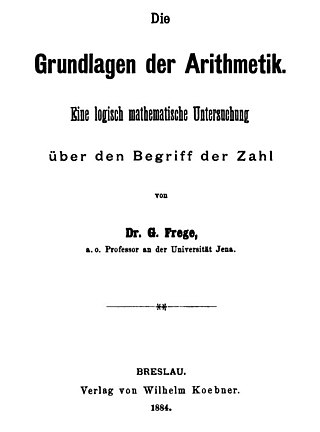
Edmund Gustav Albrecht Husserl was an Austrian-German philosopher and mathematician who established the school of phenomenology.
Logical positivism, later called logical empiricism, and both of which together are also known as neopositivism, is a movement whose central thesis is the verification principle. This theory of knowledge asserts that only statements verifiable through direct observation or logical proof are meaningful in terms of conveying truth value, information or factual content. Starting in the late 1920s, groups of philosophers, scientists, and mathematicians formed the Berlin Circle and the Vienna Circle, which, in these two cities, would propound the ideas of logical positivism.
Mathematical logic is the study of formal logic within mathematics. Major subareas include model theory, proof theory, set theory, and recursion theory. Research in mathematical logic commonly addresses the mathematical properties of formal systems of logic such as their expressive or deductive power. However, it can also include uses of logic to characterize correct mathematical reasoning or to establish foundations of mathematics.

In metaphysics, ontology is the philosophical study of being. It investigates what types of entities exist, how they are grouped into categories, and how they are related to one another on the most fundamental level. Ontologists often try to determine what the categories or highest kinds are and how they form a system of categories that encompasses the classification of all entities. Commonly proposed categories include substances, properties, relations, states of affairs, and events. These categories are characterized by fundamental ontological concepts, including particularity and universality, abstractness and concreteness, or possibility and necessity. Of special interest is the concept of ontological dependence, which determines whether the entities of a category exist on the most fundamental level. Disagreements within ontology are often about whether entities belonging to a certain category exist and, if so, how they are related to other entities.
Philosophy of science is a branch of philosophy concerned with the foundations, methods, and implications of science. The central questions of this study concern what qualifies as science, the reliability of scientific theories, and the ultimate purpose of science. This discipline overlaps with metaphysics, ontology, and epistemology, for example, when it explores the relationship between science and truth. Philosophy of science focuses on metaphysical, epistemic and semantic aspects of science. Ethical issues such as bioethics and scientific misconduct are often considered ethics or science studies rather than the philosophy of science.
The philosophy of mathematics is the branch of philosophy that studies the assumptions, foundations, and implications of mathematics. It aims to understand the nature and methods of mathematics, and find out the place of mathematics in people's lives.

Friedrich Ludwig Gottlob Frege was a German philosopher, logician, and mathematician. He was a mathematics professor at the University of Jena, and is understood by many to be the father of analytic philosophy, concentrating on the philosophy of language, logic, and mathematics. Though he was largely ignored during his lifetime, Giuseppe Peano (1858–1932), Bertrand Russell (1872–1970), and, to some extent, Ludwig Wittgenstein (1889–1951) introduced his work to later generations of philosophers. Frege is widely considered to be the greatest logician since Aristotle, and one of the most profound philosophers of mathematics ever.

Rudolf Carnap was a German-language philosopher who was active in Europe before 1935 and in the United States thereafter. He was a major member of the Vienna Circle and an advocate of logical positivism.
Intentionality is the power of minds to be about something: to represent or to stand for things, properties and states of affairs. Intentionality is primarily ascribed to mental states, like perceptions, beliefs or desires, which is why it has been regarded as the characteristic mark of the mental by many philosophers. A central issue for theories of intentionality has been the problem of intentional inexistence: to determine the ontological status of the entities which are the objects of intentional states.
In 18th- and 19th-century German philosophy, a zeitgeist is an invisible agent, force, or daemon dominating the characteristics of a given epoch in world history. The term is usually associated with Georg W. F. Hegel, contrasting with Hegel's use of Volksgeist "national spirit" and Weltgeist "world-spirit". Its coinage and popularization precede Hegel, and are mostly due to Herder and Goethe. Other philosophers who were associated with such concepts include Spencer and Voltaire. Contemporary use of the term sometimes, more colloquially, refers to a schema of fashions or fads that prescribes what is considered to be acceptable or tasteful for an era: e.g., in the field of architecture.
Gestalt Theoretical Psychotherapy(GTP) is a method of psychotherapy based strictly on Gestalt psychology. Its origins go back to the 1920s when Gestalt psychology founder Max Wertheimer, Kurt Lewin and their colleagues and students started to apply the holistic and systems theoretical Gestalt psychology concepts in the field of psychopathology and clinical psychology. Through holism, "a person's thinking, feeling, actions, perceptions, attitudes and logical operations" are seen as one unity. Many developments in psychotherapy in the following decades drew from these early beginnings, like e.g. group psychoanalysis (S. Foulkes), Gestalt therapy (Laura Perls, Fritz Perls, Goodman, and others), or Katathym-imaginative Psychotherapy (Hanscarl Leuner).

Hans Reichenbach was a leading philosopher of science, educator, and proponent of logical empiricism. He was influential in the areas of science, education, and of logical empiricism. He founded the Gesellschaft für empirische Philosophie in Berlin in 1928, also known as the "Berlin Circle". Carl Gustav Hempel, Richard von Mises, David Hilbert and Kurt Grelling all became members of the Berlin Circle.

Kurt Lewin was a German-American psychologist, known as one of the modern pioneers of social, organizational, and applied psychology in the United States. During his professional career Lewin applied himself to three general topics: applied research, action research, and group communication.
Testability is a primary aspect of science and the scientific method. There are two components to testability:
- Falsifiability or defeasibility, which means that counterexamples to the hypothesis are logically possible.
- The practical feasibility of observing a reproducible series of such counterexamples if they do exist.

In philosophy of science, the Duhem–Quine thesis, also called the Duhem–Quine problem, posits that it is impossible to experimentally test a scientific hypothesis in isolation, because an empirical test of the hypothesis requires one or more background assumptions : the thesis says that unambiguous scientific falsifications are impossible. It is named after French theoretical physicist Pierre Duhem and American logician Willard Van Orman Quine, who wrote about similar concepts.
Verificationism, also known as the verification principle or the verifiability criterion of meaning, is the philosophical doctrine which asserts that a statement is meaningful only if it is either empirically verifiable or a truth of logic.
A metatheory or meta-theory is a theory the subject matter of which is theory itself, for example as an analysis or description of existing theory. For mathematics and mathematical logic, a metatheory is a mathematical theory about another mathematical theory. Meta-theoretical investigations are part of the philosophy of science. The topic of metascience is an attempt to use scientific knowledge to improve the practice of science itself.

The Foundations of Arithmetic is a book by Gottlob Frege, published in 1884, which investigates the philosophical foundations of arithmetic. Frege refutes other theories of number and develops his own theory of numbers. The Grundlagen also helped to motivate Frege's later works in logicism. The book was not well received and was not read widely when it was published. It did, however, draw the attentions of Bertrand Russell and Ludwig Wittgenstein, who were both heavily influenced by Frege's philosophy. An English translation was published by J. L. Austin, with a second edition in 1960.
Ernst Julius Wilhelm Schuppe was a German positivist philosopher, born in Brieg, Silesia. He advocated what he called 'immanent philosophy'.
Philosophy of logic is the area of philosophy that studies the scope and nature of logic. It investigates the philosophical problems raised by logic, such as the presuppositions often implicitly at work in theories of logic and in their application. This involves questions about how logic is to be defined and how different logical systems are connected to each other. It includes the study of the nature of the fundamental concepts used by logic and the relation of logic to other disciplines. According to a common characterization, philosophical logic is the part of the philosophy of logic that studies the application of logical methods to philosophical problems, often in the form of extended logical systems like modal logic. But other theorists draw the distinction between the philosophy of logic and philosophical logic differently or not at all. Metalogic is closely related to the philosophy of logic as the discipline investigating the properties of formal logical systems, like consistency and completeness.







